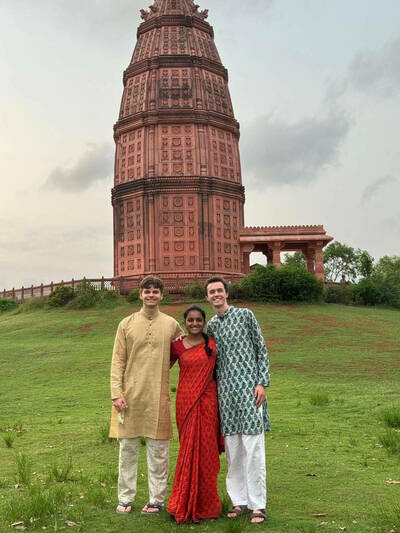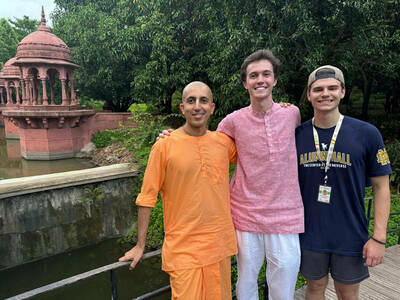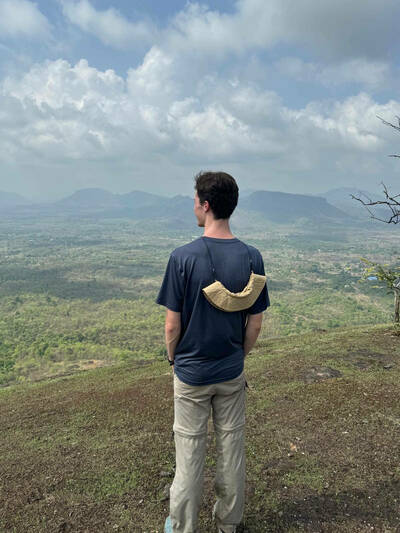Bridging spirituality and sustainability: A Notre Dame student's fellowship in India

Ty Harrington, a junior from Carmel, Indiana, majoring in liberal studies with a double major in philosophy and theology, spent his summer immersed in a unique and transformative experience in India. Ty’s journey led him to a wellness ashram known for its advanced research and implementation of sustainable practices, where he explored the philosophical connections between spirituality, sustainability, and the climate crisis.
A Path to India: How It All Began
The opportunity to spend the summer in India was a result of Ty’s participation in the Center for Social Concerns Summer Fellowship, a program designed for rising juniors and seniors interested in service, spirituality, and academic research. Ty's curiosity about the philosophical underpinnings of the climate crisis guided the Center's faculty to match him with Govardhan Ecovillage (GEV). GEV, situated near Mumbai, serves as both a spiritual retreat and a hub for sustainability research, making it the ideal location for him to pursue his interests in philosophy, spirituality, and environmental issues.
“I was interested in understanding the philosophical foundations of the climate crisis—how different thinkers over time perceive our relationship with the natural world,” Ty explained. “GEV was the perfect place to explore this, as it integrates philosophy, spirituality, and sustainability in addressing the climate crisis.”
The Research: Spirituality and Sustainability
Ty’s research project, titled "Spirituality and Sustainability: Modern Cosmology, Spiritual Cosmology, and Vedanta Hinduism at Govardhan Ecovillage," delves into the relationship between spirituality and environmental stewardship. At the heart of his research is a profound question: “What does spirituality have to do with sustainability?”

To answer this, Ty explored two dimensions: the individual level and the philosophical level. At the individual level, Ty argued that spiritual and religious practices inherently promote a life of virtue, which aligns with environmentally friendly behaviors. “Religions across the world encourage their followers to reduce greed, selfishness, and anthropocentrism—traits that are at the core of the climate crisis,” Ty noted. “By guiding individuals toward virtue, spirituality naturally mitigates the human behaviors that are most harmful to the environment.”
On a deeper, philosophical level, Ty's research contrasts modern cosmology with spiritual cosmology. “Modern cosmology often views the natural world as a collection of dead objects, separate from the divine,” he explained. “Spiritual cosmology, like that found at GEV, integrates the natural world within a holistic framework that includes both human beings and the divine, recognizing the sacredness of all life.”
Through this dual exploration, he argued that spirituality presents a radically new way of perceiving the natural world—one that does not see it as mere objects but as sacred entities interconnected with the divine.
Connecting with Notre Dame’s Mission
Ty feels that his research aligns well with Notre Dame’s mission to be a force for good, especially in the area of environmental justice. “Notre Dame, as a Catholic institution, has a unique role to play in discussions about how spirituality can address the climate crisis,” he emphasized. “This issue disproportionately impacts marginalized communities, and the University has the potential to be a leading voice in advocating for environmental awareness and justice.”

Personal and Academic Takeaways
Reflecting on his time at GEV, Ty shared that his biggest academic insight was discovering the shared truths between his Catholic faith and the spiritual tradition of Vedanta Hinduism. “It was intellectually satisfying to see authors from different traditions and times arrive at similar conclusions about the natural world,” he said. He found the ashram setting at GEV supportive of his faith, enjoying the serene, natural surroundings and cultural experiences like participating in the Rath Yatra festival.
His experience in India deepened his appreciation for the connections between different religious traditions, reinforcing his belief that spirituality can play a significant role in promoting environmental awareness.
Looking Ahead
Ty's time in India has profoundly shaped his worldview. “This experience has strengthened my faith while broadening my understanding of other traditions,” he shared. “I’m grateful for the opportunity to conduct this research in such a unique setting, and I hope it inspires others to see how spirituality can help address the world's most pressing issues.”
Ty’s journey to India highlights the transformative power of cross-cultural exchange and academic exploration, demonstrating that spirituality and sustainability are deeply linked—and both are essential in tackling the climate crisis together.
Interested in pursuing a program in India? Visit the Notre Dame Mumbai website to learn about study abroad and research opportunities.
Originally published by at mumbai.nd.edu on September 12, 2024.
Latest Research
- Notre Dame Lead Innovation Team partners with local WIC program to identify, prevent lead poisoning in childrenB.A.B.E. store “shoppers” now have something new to help their families: free lead screening kits offered by the University of Notre Dame’s Lead Innovation Team.
- Notre Dame Welcomes Ninth Cohort of Warrior-Scholars for Transformative Academic JourneyNOTRE DAME, IN – The University of Notre Dame recently concluded its ninth successful Warrior-Scholar Project (WSP) boot camp, hosting 34 dedicated Warrior-Scholars from June 21st to 28th. This intensive, week-long academic residency provided transitioning service members and veterans…
- Entrepreneurship and Empowerment in South Africa study abroad program celebrates 25 yearsThis year, the Entrepreneurship and Empowerment in South Africa (EESA) program marked its 25th year of operation. EESA is a six-week summer study abroad program that enables students to help historically…
- Vatican honors Martin and Carmel Naughton with papal awardCarmel…
- Brain tumor growth patterns may help inform patient care managementAssistant Professor Meenal Datta (University of Notre Dame/Wes Evard) A team of researchers from the University of Notre Dame, Harvard Medical School/Massachusetts General Hospital, and Boston University has developed a technique for measuring a brain tumor’s mechanical force and a new model to estimate how much brain tissue a patient has lost.
- Biseach Symposium Strengthens Cancer Research Partnership Between Notre Dame and University of Galway…













